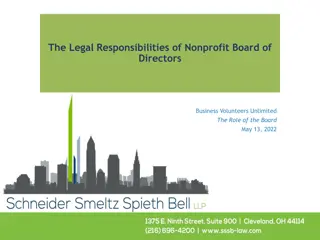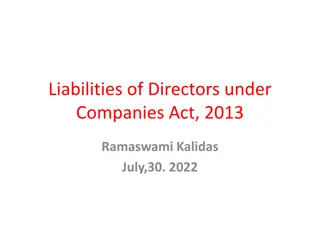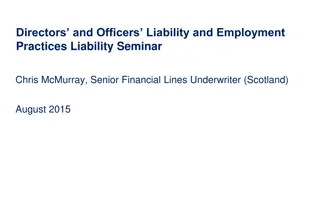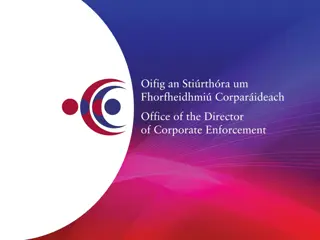
Understanding the Role and Requirements of Directors in Companies
Discover the statutory definitions of directors, including types like shadow directors and inside directors, alongside regulations on the minimum and maximum number of directors in public, private, and one-person companies. Learn about the director's obligations and qualifications under the Companies Act 2013.
Download Presentation

Please find below an Image/Link to download the presentation.
The content on the website is provided AS IS for your information and personal use only. It may not be sold, licensed, or shared on other websites without obtaining consent from the author. If you encounter any issues during the download, it is possible that the publisher has removed the file from their server.
You are allowed to download the files provided on this website for personal or commercial use, subject to the condition that they are used lawfully. All files are the property of their respective owners.
The content on the website is provided AS IS for your information and personal use only. It may not be sold, licensed, or shared on other websites without obtaining consent from the author.
E N D
Presentation Transcript
Deptt. of Commerce Deptt. of Commerce Government College, Dera Bassi Government College, Dera Bassi
Statutory definition of director According to section 2(34) of the companies act 2013, director means a director appointed to the board of a company It does not matter much what you call them so long as you understand what the true position is which is they are commercial men managing a trading concern for the benefit of themselves and all other shareholder .
A person in accordance with whose directions and instruction the board of directors of company is accustomed to act shall be deemed to be director of the company. Such persons have been addressed under English law as ShadowDirector . The person in accordance with whose direction or instructions the BOD is accustomed to act need not necessarily b an individual.
No body corporate ,association or firm shall be appointed director of a company and only individual shall be so appointed (section 149). It is because that the office of a director is to some extent an office of trust. If all the members of a company are bodies corporate, it will be impossible to comply with this section , expect when; (a) The company s articles provide that no qualification shares are necessary so that outsiders may be appointed as directors of the company ; or (b) The members who are bodies corporate appoint their own nominees and transfer qualification shares to them.
Director Inside Director/executive director Non- executive/outside directors Whole time employee of the company These directors are not in employment Associated with day to day working of company of the company. Instead of receiving Company and receive remuneration remuneration they receive sitting fee. EXAMPLES, M.D , W.T.D. Technical director Examples. Professional directors,
THE MINIMUM AND MAXIMUM NUMBER OF DIRECTORS .Every public company must have at least 3 directors and every private company must have a minimum of 2 directors and every one person company must have 1 director.
In the case of a public company any increase in the number of directors more than 15, the shareholder can do so by passing a special resolution in the general meeting. Public company Public company Private company Private company One person company One person company Minimum no. of directors Maximum no. of directors For more than 15 directors 3 2 1 of 15 15 15 Pass a special resolution Pass a special resolution Pass a special resolution
Woman directors All least one woman director in Every listed company Every public company Paid up share capital of Turnover 100 crores rupees or more of 300 crores or more
ORDINARY DIRECTORS MANAGING DIRECTORS WHOLE TIME/EXECUTIVE DIRECTORS ADDITIONAL DIRECTORS ALTERMATE DIRECTORS PROFESSIONAL DIRECTORS NOMINEE DIRECTORS INDEPENDENT DIRECTORS SMALL SHAREHOLDER DIRECTORS
As per Rule 9 of the company ( Appointment and Qualification of directors) rules 2014, every individual who is an existing directors or intends to be appointed as directors of a company, is required to apply for Director Identification number electronically in form DIR-3 to the Central Government for allotment of a DIN.
Every person or individual desirous of being appointed as the directors of a company ought to apply for the din, or should have the DIN obtained beforehand. Resignation from the post of directors of the company , does not affect the validity of the DIN or its discretionary power Foreign national holding the post of the directors in any Indian company, is forced by the rules to possess DIN.
DIR-3 has to follow the offline e-Filing process. For more details regarding the same visit e-Filing FAQ s. Attach the photograph and scanned copy of supporting document i.e. proof of identity ,and proof of residence as per the guidelines. Physical documents are not required to submit at DIN cell. Along with the supporting document , verification by the applicant for applying for allotment of Directors Identification Number shall also be attached .This shall contain the Name , Father s Name, date of birth and text of declaration and physical signature of the applicant. The e-Form shall have to be digitally signed and shall be uploaded on MCA21 portal. Upon upload ,pay the fees for DIR -3 e-Form . Only electronic payment of the fees shall be allowed (i.e. Net banking /credit card). No challan payment will be accepted under revised procedure of DIN allotment. The applicant is required to get himself/herself registered on the MCA21 portal to obtain login id, which is necessary for payment of the fees, After obtaining the login-id , login to the MCA21 portal and click on e- Form DIR-3 upload link available under the e-form tab for uploading the e-form DIR3 will be processed only after the DIN application fee is paid.
A digital signature certificate , like hand written signature, establishes the identity of the sender filing the document through internet which sender can not revoke or deny. According, digital signature certificate is a digital equivalent of a hand written signature which has an extra data attached electronically to any message or a document. A DSC is normally valid for 1 or 2 years , after which it can be renewed.
With the launch of MCA21, e-filing and e- governance is the buzzword. This has made possible for company Directors, Professionals. Financial Institutions and other Authorized Signatories to do e-filing with the MCA. After MCA income tax also went online by launching its website for filing e- returns.
Maximum number of directorship including alternate directorship 20 Maximum number of public companies in which a person can be appointed as a Director 10 Public companies shall include private companies that are either holding or subsidiary company of public company. Subject to the provision of subsection (1)of section 165 a member of a company may, be special resolution , specify the number less than 20 or 10 companies, as the case may be, in which a director. Any person holding office as director in companies more than the limit before the commencement of the act shall within a period of 1 year from such commencement.
If a person accepts an appointment as a Director in the companies above the prescribed limits Fine: Rs.5000 to Rs. 25000 For every day after the first 20 during which the contravention continues
Directors as Agent Directors as Trustees Directors as Officers in the company Directors as Employees Directors as Managing Partners
The success of a company depends to great extent , upon the competence and honesty of it directors. It is therefore desirable that the administration of companies should be in right hands 1) By the Articles as regard first director(section152) 2) By the company at General Meeting (section152&160) 3) By the Principal of Proportional Representation (section 163) 4) By the Board (section 161) 5) By Third parties (section152) 6) By the central government 7) By the small shareholders. 8) BY the Tribunal in sick industries
Qualifications The companies Act does not lay down any specified academic qualification for appointment as a company director , not even qualification shares. So far as the act is concerned a director need not hold any shares and shares and need not be a member of a company. Qualifications for for director director
If the company is wound up during this period of two month , such director cannot be placed on the list of contributories in as much as there is no express or implied contract under which he would be bound to take the Qualification shares
The circumstances in which a person cannot be appointed as a director of a company are enumerated in section 164. According to this section , a person cannot be appointed as a director of a company, if (1) U/S 164(1): 1) He has been found to be of unsound mind by a competent court and the finding is in force; 2) he is undischarged insolvent 3)He has applied to be adjudicated as an insolvent and his application is pending
A director may be removed from his office; 1) By the Shareholders (section 169); 2) By the Tribunal ( section 242)
A DIRECTOR MAY RESIGN BY GIVING NOTICE IN WRITING TO THE COMPANY AND BOARD OF DIRECTORS THE RESIGNING OF MAY ALSO FORWARD A COPY OF THE RESIGNATION TO THE REGISTRAR ALONGWITH THE REASONS FOR RESIGNATION EFFECTIVE DATE OF RESIGNATION BY THE DIRECTOR DIRECTOR SHALL BE LIABLE AFTER HIS RESIGNATION FOR OFFENCES WHICH OCCURRED DURING HIS TENURE POWER TO APPOINT DIRECTOR IN CASE WHERE ALL THE DIRECTOR RESIGN FROM THE COMPANY DUTY OF THE AFTER RESIGNATION
A Company being an artificial person , act through its directors. The directors represent the directing mind or will of the company and control what it does. All the power of management of the affairs of the company and vested in the board of directors
GERNAL POWER: Power which can be exercised in accordance with the articles POWER :U/S 179(3):Power which can be exercised only at board meetings POWER UNDER RULE 8. OTHER MATTERS.
Power to sell, lease or otherwise dispose of the whole or substantially the whole of the undertaking of the company. Power to remit or give time for repayment of any debt due to the company by a director. Power to invest otherwise than in trust securities, the amount received by the company in respect of the compulsory acquisition Power to borrow money. Power to contribute to (sec.181)
The liabilities of directors can be classified into: 1 ) civil liability 2) criminal liability Civil liability themselves liable to (a) the company ;and (b)to the third parties. Criminal liability certain duties upon the director and they may be liable to penalties by way of fine or imprisonment if they fail to perform them. Civil liability: The directors may render Criminal liability: Companies act 2013, impose
As director are not servants of the company they have no right for payment unless it is provided in the article. In the absence of an express agreement regarding remuneration, the directors render services to the company gratuitously and not for reward. The expression managerial remuneration refers to the remuneration payable to the (a) Managing director: (b) Whole time director (c) Manager
Section 197 fixes an overall limit of managerial remuneration payable by a public company and a private company provides that a company may pay to its directors and manger in respect of any financial year remuneration not exceeding eleven per cent of its net profit of that year.
In order to make this limit meaningful and to prevent directors from drawing more money in the guise of collateral benefits, the explanation to section 197 provides that the word Remuneration shall included the following Any expenditure incurred by the company for providing rent free accommodation or any other benefit or amenity in respect of accommodation or otherwise free to change Any expenditure incurred by the company for providing rent free accommodation or any other benefit or amenity in respect of accommodation or otherwise free to change
DIRECTORS REMUNERATION TO BE FIXED BY ARTICLES OR RESOLUTION IN GERNAL MEETING Payment of remuneration to managing or whole time director.






















